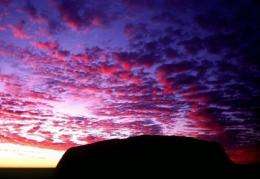Sunrise over Uluru (Ayer's Rock), the largest single rock monolith in the world, in central Australia. An Australian study has uncovered signs that the country's ancient Aborigines may have been the world's first stargazers, pre-dating Stonehenge and Egypt's pyramids by thousands of years.
An Australian study has uncovered signs that the country's ancient Aborigines may have been the world's first stargazers, pre-dating Stonehenge and Egypt's pyramids by thousands of years.
Professor Ray Norris said widespread and detailed knowledge of the stars had been passed down through the generations by Aborigines, whose history dates back tens of millennia, in traditional songs and stories.
"We know there's lots of stories about the sky: songs, legends, myths," said Norris, an astronomer for Australia's science agency, the Commonwealth Scientific and Research Organization (CSIRO).
"We wondered how much further does it go than that. It turns out also people used the sky for navigation, time-keeping, to mark out the seasons, so it's very practical.
"People were nomadic so when Pleiades (the Seven Sisters star cluster) was up they would move to where the nuts and berries are. Another sign and it would be time to move to the rivers to fish for barramundi, and so on."
Norris, who has studied Aboriginal culture and historical accounts by white settlers, and made several trips to Arnhem Land in Australia's remote Outback, said his research also revealed more detailed astronomical thought.
"Clearly some thinker in the past has been sitting down in the bush, watching an eclipse and trying to figure out how it works," he said, giving one example.
"Those thoughts are then encoded in the songs and ceremonies. If you take a lunar eclipse, the story in Arnhem Land is it's the Sun Woman and Moon Man making love, and when they make love the body of one covers the other."
Norris is now searching for evidence that would put a date on Aboriginal astronomy, such as a rock-carving of a meteor strike or comet.
He is confident the Aborigines pre-dated European stargazers, including Britain's astronomy-linked Stonehenge, which is estimated at 3,100 BC, around the age of the Great Pyramid of Giza.
"We've established there is all this astronomy, what I don't know is how far back this goes. If it goes back 10,000 or 20,000 years, that makes (Aborigines) the world's first astronomers," he said.
(c) 2010 AFP




















